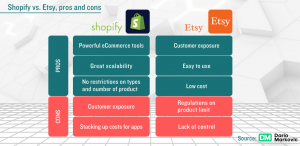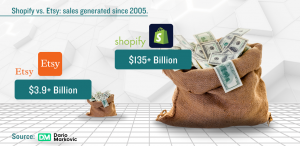Shopify vs. Etsy: Which One Will Make Me More Money in 2024?
As an online seller, I’ve been wondering which platform will help me rake in the most cash in 2024. Two popular options are Shopify and Etsy, each with its own strengths and weaknesses. In this blog post, I’ll dive into the world of e-commerce and compare Shopify vs. Etsy to help any potential seller in a similar situation make an informed decision.
3 Point Summary
- Fees and Scalability: Shopify’s fees can be more cost-effective in the long run, especially for high-ticket items or large volumes of sales. Additionally, Shopify is designed to handle massive scalability, making it an excellent choice for businesses with rapid growth potential.
- Target Audience and Product Flexibility: Etsy’s audience is primarily focused on buyers looking for unique, handmade, or vintage items, limiting marketing opportunities and product flexibility. Shopify, on the other hand, allows for complete control over branding, marketing, and customer targeting, making it ideal for businesses with complex product offerings.
- Statistics and Growth Potential: Shopify has a larger user base and higher average revenue per user (ARPU) compared to Etsy. Shopify merchants sold over $40 billion worth of products in 2020 alone, while Etsy sellers sold over $10 billion worth of products in the same year. This suggests that Shopify may have more growth potential for businesses looking to scale.

The Basics: Shopify vs. Etsy
Before I dive into the nitty-gritty, let me cover the basics.
- Shopify is a comprehensive e-commerce platform that allows me to create my own online store, customize it, and sell products directly to customers.
- Etsy, on the other hand, is a niche marketplace focused on handmade, vintage, and unique items.
To read about how Shopify compares to other platforms, you can read this blog post here, to learn about Shopify vs. Wix, and this one, about Shopify vs. ClickFunnels.
Fees: The Money-Making Factor
When it comes to fees, Shopify and Etsy have different structures that can impact the bottom line. Here’s a breakdown:
- Shopify: Shopify charges a monthly subscription fee, which ranges from $29 to $299, depending on the plan I choose. Additionally, there’s a processing fee, which vary between 2.4% + 30¢ and 2.9% + 30¢ per transaction.
- Etsy: Etsy charges a listing fee of $0.20 per item, and a transaction fee of 3.5% on sales. Payment processing fees range from 3% + 25¢ to 3.5% + 25¢ per transaction.
At first glance, Etsy’s fees might seem more appealing, especially if one planets on selling low-priced items. However, Shopify’s fees can be more cost-effective in the long run, especially if selling high-ticket items or having a large volume of sales.
Target Audience: Who’s Buying?
Your target audience can significantly impact your sales and revenue. Here’s how Shopify and Etsy differ:
- Shopify: With Shopify, you can have complete control over your store’s branding, marketing, and customer targeting. You can sell to anyone, anywhere, and tailor your marketing efforts to specific demographics.
- Etsy: Etsy’s audience is primarily focused on buyers looking for unique, handmade, or vintage items. While this can be a lucrative niche, it limits my customer base and marketing opportunities.
Product Flexibility: What Can I Sell?
The types of products you can sell on Shopify and Etsy differ significantly:
- Shopify: With Shopify, you can sell anything from physical products to digital goods, services, and even subscriptions. The platform offers extensive product customization options, making it ideal for businesses with complex product offerings.
- Etsy: Etsy is geared towards sellers of handmade, vintage, or unique items, including jewelry, crafts, art, and collectibles. While you can sell some digital goods, Etsy’s focus is on physical products.

Marketing and Promotion: Getting the Word Out
Marketing and promotion are crucial to driving sales and revenue. Here’s how Shopify and Etsy compare:
- Shopify: Shopify offers built-in SEO tools, social media integration, and email marketing features, but those tools work best when combined with a fast, customizable theme. You also have complete control over marketing strategy and budget.
- Etsy: Etsy provides some promotional tools, such as promoted listings and sales, but marketing options are limited compared to Shopify. Etsy’s algorithm also plays a significant role in product visibility, which can impact sales.
Scalability: Growing My Business
As my business grows, I’ll need a platform that can scale with me. Here’s how Shopify and Etsy compare:
- Shopify: Shopify is designed to handle large volumes of traffic and sales, making it an excellent choice for businesses with rapid growth potential. You can easily upgrade or downgrade my plan as needed.
- Etsy: While Etsy can handle a decent volume of sales, it’s not designed for massive scalability. As your business grows, you may find Etsy’s limitations restrictive, and you may need to migrate to a more robust platform.
Statistics: The Numbers Don’t Lie
Here are some statistics to help me make a more informed decision:
- Shopify:
- Over 2 million active stores on the platform (Source: Shopify)
- Average revenue per user (ARPU) is around $1,500 (Source: Shopify)
- Shopify merchants sold over $40 billion worth of products in 2020 alone (Source: Shopify)
- Etsy:
- Over 45 million active buyers on the platform (Source: Etsy)
- The average sale price per item is around $30 (Source: Etsy)
- Etsy sellers sold over $10 billion worth of products in 2020 alone (Source: Etsy)
- Etsy’s gross merchandise sales (GMS) grew 23% year-over-year in 2020 (Source: Etsy)
Conclusion: Which One Will Make Me More Money in 2024?
So, which platform will make you more money in 2024 and 2025? The answer depends on my business model, products, and target audience.
If you’re selling unique, handmade, or vintage items, Etsy might be the better choice, especially if you’re just starting out. However, if you’re looking for more control over my brand, marketing, and customer targeting, or if you’re selling a wide range of products, Shopify is likely the way to go.
Ultimately, it’s essential to weigh the fees, target audience, product flexibility, marketing and promotion options, and scalability of each platform before making a decision. By choosing the right platform for my business, I’ll be well on my way to maximizing my revenue in 2024.
The Final Verdict
In the battle of Shopify vs. Etsy, the winner is… it depends on your business needs! Both platforms have their strengths and weaknesses, and the right choice for you will depend on your unique circumstances.
If your still unsure, consider the following:
- If you want more control over my brand and marketing, choose Shopify.
- If you’re selling unique, handmade, or vintage items, Etsy might be the better choice.
- If you’re looking for more product flexibility and scalability, Shopify is likely the way to go.
Whichever platform you choose, remember to focus on providing excellent customer service, creating high-quality products, and continually optimizing your marketing strategy to drive sales and revenue in 2024.
FAQ:
Q1: What are the main differences between Shopify and Etsy?
A1: Shopify is a comprehensive e-commerce platform that allows you to create your own online store, customize it, and sell products directly to customers. Etsy, on the other hand, is a niche marketplace focused on handmade, vintage, and unique items.
Q2: Which platform has lower fees?
A2: Etsy’s fees might seem more appealing at first, especially if you’re selling low-priced items. However, Shopify’s fees can be more cost-effective in the long run, especially for high-ticket items or large volumes of sales.
Q3: Can I sell anything on Shopify?
A3: Yes, with Shopify, you can sell anything from physical products to digital goods, services, and even subscriptions. The platform offers extensive product customization options, making it ideal for businesses with complex product offerings.
Q4: Is Etsy only for handmade or vintage items?
A4: While Etsy is primarily focused on handmade, vintage, or unique items, you can also sell some digital goods. However, Etsy’s focus is on physical products, and you’ll need to ensure your products meet their guidelines.
Q5: Which platform is better for scaling my business?
A5: Shopify is designed to handle large volumes of traffic and sales, making it an excellent choice for businesses with rapid growth potential. You can easily upgrade or downgrade your plan as needed, and Shopify provides more scalability options compared to Etsy.
